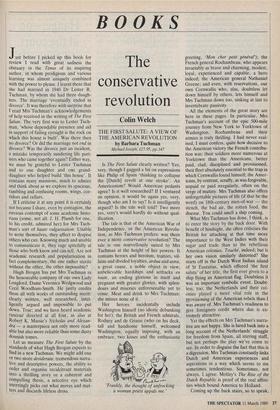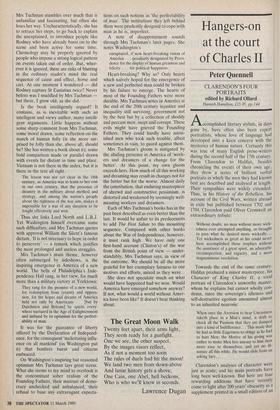BOOKS
The conservative revolution
Colin Welch
THE FIRST SALUTE: A VIEW OF THE AMERICAN REVOLUTION by Barbara Tuchman
Michael Joseph, £15.95, pp.347
Just before I picked up this book for review I read with great sadness the obituary in the Times of its inspiring author, in whom prodigious and various learning was almost uniquely combined with the power to please. I learnt there that she had married in 1940 Dr Lester R. Tuchman, by whom she had three daugh- ters. The marriage 'eventually ended in divorce'. It was therefore with surprise that I read Mrs Tuchman's acknowledgements of help *received in the writing of The First $,alute. The very first was to Lester Tuch- man, 'whose dependable presence and aid in support of failing eyesight is the rock on which this house is built'. Was there then no divorce? Or did the marriage not end in divorce? Was the divorce just an incident, a mistake temporarily sundering life part- ners who came together again? Either way, we must be grateful to Lester Tuchman and to one daughter and one grand- daughter who helped build 'this house'. It contains many mansions, much to admire and think about as we explore its spacious, rambling and confusing rooms, wings, cor- ridors and cellars.
III criticise it at any point it is certainly not because I share, even by contagion, the envious contempt of some academic histo- rians (some, not all: J. H. Plumb for one, to his credit, admired her) for Mrs Tuch- man's sort of haute vulgarisation. Unable to write themselves, they affect to despise others who can. Knowing much and unable to communicate it, they rage spitefully at those who both know and can tell. Are not academic research and popularisation in fact complementary, the one rather sterile Without the other, the other impossible?
Hugh Brogan has put Mrs Tuchman in the honourable company of our own Lady Longford, Dame Veronica Wedgwood and Cecil Woodham-Smith. He justly credits them all with 'works of outstanding *writ: Clearly written, well researched, intel- ligently argued and impossible to put down. True; and we have heard academic rancour directed at all four, as also at Robert K. Massie's Nicholas and Alexan- dra — a masterpiece not only more read- able but also more reliable than some dusty donnish tomes.
Let us measure The First Salute by the standards of what Hugh Brogan expects to find in a new Tuchman. We might add one or two more desiderata: tremendous narra- tive and descriptive powers, the ability to order and organise recalcitrant materials into a thrilling story or a coherent and compelling thesis, a selective eye which unerringly picks out what moves and mat- ters and discards lifeless dross. Is The First Salute clearly written? Yes, very, though I gagged a bit on expressions like Philip of Spain 'thinking to collapse the [Dutch] revolt at one stroke'. An Americanism? Would American pedants agree? Is it well researched? If I ventured an opinion, it would be again yes, very, though who am Ito say? Is it intelligently argued? Is the tale well told? Two more yes, very's would hardly do without qual- ification.
The tale is that of the American War of Independence, 'or the American Revolu- tion, as Mrs Tuchman prefers: was there ever a more conservative revolution? The tale is one marvellonsly suited to Mrs Tuchman at the height of her powers. It contains heroes and heroism, traitors, vil- lains and divided loyalties, ardua and astra, a great cause, a noble object in view, unbelievable hardships and setbacks en route, an • ending glorious in itself and pregnant with greater glories, with splen- dours and miseries unforeseeable yet to come. Meat and drink to Mrs Tuchman: she misses none of it.
Her heroes incidentally include Washington himself (no idiotic debunking for her); the British and French admirals, Rodney and de Grasse (who on his deck, tall and handsome himself, welcomed Washington, equally imposing, with an embrace, two kisses and the enthusiastic 'Frankly, the thought of unfrocking a woman priest appals me.' greeting, 'Mon cher petit genera); the French general Rochambeau, who appears invariably as brave and charming, modest, loyal, experienced and capable, a hero indeed; the American general Nathaniel Greene; and even, with reservations, our own Cornwallis who, alas, doubtless let down himself by others, lets himself and Mrs Tuchman down too, sinking at last to invertebrate passivity.
All the• elements of the great story are here in these pages. In particular, Mrs Tuchman's account of the epic 500-mile journey from New York to Yorktown of Washington, Rochambeau and their armies is truly thrilling. I had never real- ised, I must confess, quite how decisive to the American victory the French contribu- tion was: their soldiers more numerous at Yorktown than the Americans, better paid, clad, disciplined and provisioned, their fleet absolutely essential to the trap in which Cornwallis found himself; the Amer- icans, by contrast, scruffy, as was forgivable, unpaid or paid irregularly, often on the verge of mutiny. Mrs Tuchman also offers unforgettable pictures of life (if that be the word) on 18th-century men-of-war — the stench, the bad air, the rotten food, the disease. You could smell a ship coming.
What Mrs Tuchman has done, I think, is to enter the story by the back door. With benefit of hindsight, she often criticises the British for attaching at that time more importance to the West Indies with their sugar and trade than to the rebellious
American colonies. Touché, indeed; but is her own vision similarly distorted? She
starts off in the Dutch West Indian island of St Eustatius, which offered 'the first salute' of her title, the first ever given to a ship flying an American flag. Doubtless it was an important symbolic event. Doubt- less, too, the Netherlands and their col- onies played a more vital role in the provisioning of the American rebels than I was aware of. Mrs Tuchman's readiness to give foreigners credit where due is ex- tremely attractive. Yet the effects on Mrs Tuchman's narra- tive are not happy. She is lured back into a long account of the Netherlands' struggle for freedom from Spain, all stirring stuff, but not perhaps the play we've come to see. In order to disguise the fact that this is a digression, Mrs Tuchman constantly links Dutch and American experiences and
aspirations in a way which seems to me sometimes tendentious. Sometimes, not always, I agree: Motley's The Rise of the Dutch Republic is proof of the real affini- ties which bound America to Holland.
Coming up the back stairs, so to speak,
Mrs Tuchman stumbles over much that is unfamiliar and fascinating, but often she loses her way. Uncharacteristically, she has to retrace her steps, to go back to explain the unexplained, to introduce people like Rodney who have already burst on to the scene and been active for some time. Chronology may be properly ignored by people who impose a strong logical pattern on events taken out of order. But, wher- ever it is ignored, there are risks of blurring in the ordinary reader's mind the real sequence of cause and effect, horse and cart. At one moment I Wondered — did Rodney capture St Eustatius twice? Never before was I muddled by Mrs Tuchman — but there, I grow old, as she did.
Is the book intelligently argued? It contains, as is inevitable with such an intelligent and viewy author, many intelli- gent arguments. Little happens without some sharp comment from Mrs Tuchman, some 'moral drawn, some reflection on the march of human folly (is she more sur- prised by folly than she, above all, should be? She has written a book about it), some bold comparison made or parallel drawn with events far distant in time and place. Vietnam is not there in the index, but if is there in the text all right.
The lesson was not yet clear in , the 18th century, as America was to learn to her cost in our own century, that the presence of disunity in the military about method and strategy, and among the nation's people about the rightness of the war aim, makes it impossible for a war of any duration to be fought effectively and won.
Thus she links Lord North and L.B.J. Yet Washington himself overcame some such difficulties; and Mrs Tuchman quotes with approval William the Silent's famous dictum, 'It is not necessary to hope in order to persevere' — a remark which justifies the most prolonged and useless struggles.
Mrs Tuchman's main theme, however often submerged by sideshows, is the inspiring emergence in America of a new world. The bells of Philadelphia's Inde- pendence Hall rang, in her view, for much more than a military Victory at Yorktown: They rang for the promise of a new world,
for redemption from tyranny and oppres- sion, for the hopes and dreams of America held not only by Americans . . . [but by Dutchmen and Britons] by spirits every- where nurtured in the Age of Enlightenment and imbued by its optimism for the perfect- ability of man.
It was for the guarantee of liberty offered by the Declaration of Independ- ence, for the consequent 'meliorating influ- ence on all mankind' (as Washington put it) that bonfires burnt and citizens embraced.
On Washington's inspiring but reasoned optimism Mrs Tuchman lays great stress. What she seems to my mind to overlook is the concomitant sober " realism of the Founding Fathers, their mistrust of demo- cracy unchecked and unbalanced, their refusal to base any extravagant expecta- tions on such notions as `the perfectability of man'. The institutions they left behind them were prudently designed to cope With man as he is, imperfect.
• A note of disappointment sounds through Mrs Tuchman's later pages. She notes Washington's
• enraptured, if now heart-breaking vision of America . . . peculiarly designated by Provi- dence for the display of human greatness and felicity . . . for political happiness.
,Heart-breaking? Why so? Only hearts which naïvely hoped for the emergence of a new and perfected man could be broken by his failure to emerge. The hearts of most of the Founding Fathers were more durable. Mrs Tuchman notes in America at the end of the 20th century injustice and inequality still surviving, government not by the best but by a collection of shoddy and peccant men, inept and corrupt. These evils might have grieved the Founding Fathers. They could hardly have aston- ished men whO took such trouble, albeit sometimes in vain, to guard against them.
Mrs Tuchman's gloom is mitigated by the abiding presence in Afrierica of 'work- ers and dreamers of a change for the better'. At this point, my own gloom exceeds hers. How much of all this working and dreaming may result in changes not for the better but for the worse. Almost daily the constitution, that enduring masterpiece of shrewd and constructive pessimism, is distorted and weakened by seemingly well- meaning workers and dreamers.
Each of Mrs Tuchman's books has in the past been described as even better than the last. It would be unfair to its predecessors to add The First Salute to this mounting sequence. Compared with other books about the War of Independence, however, it must rank high. We have only one first-hand account (Clinton's) of the war from the British point of view — under- standably, Mrs Tuchman says, in view of the outcome. We should be all the more grateful for her exemplary fairness to our motives and efforts, mixed as they were.
She does not speculate much on what would have happened had we won. Would America have emerged somehow anyway? If not, what would a world without Amer- ica have been like? It doesn't bear thinking about.



























































 Previous page
Previous page